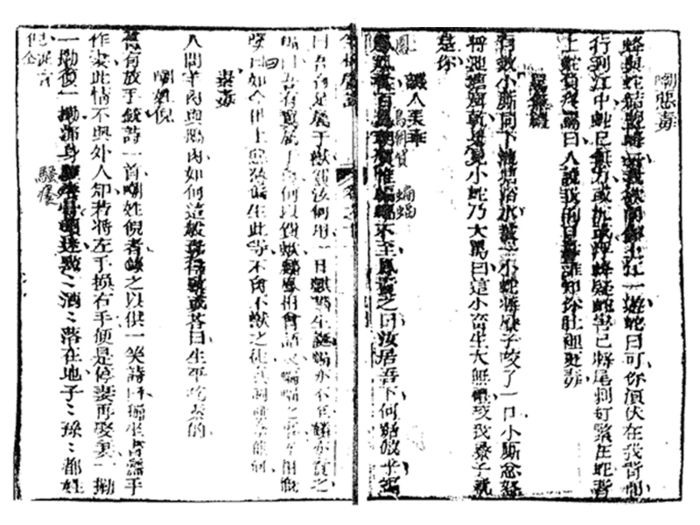(Translation) 2019 不禽不獸
| Primary Source | ||
|---|---|---|
 |
Title | |
| English | Neither a Bird nor a Beast | |
| Chinese | 不禽不獸 | |
| Korean(RR) | ||
| Text Details | ||
| Genre | Humor | |
| Type | Literature | |
| Author(s) | 笑林廣記 (Xiaolin Guangji) | |
| Year | 1574-1646 | |
| Source | 廣笑府 (Guang Xiao Fu)/笑府 (Xiao Fu) by 馮夢龍 (Feng Menglong) | |
| Key Concepts | Fenghuang, bats, qilin | |
| Translation Info | ||
| Translator(s) | Participants of 2019 JSG Summer Hanmun Workshop (Intermediate Training Group) | |
| Editor(s) | Nadia Arzberger | |
| Year | 2019 | |
Original Script
Translation
Student Translation : Nadia Arzberger
Mythical bird (fenghuang)'s long life celebration, [where] hundreds of birds came to congratulate him, only the bat did not come. The mythical bird reproaches the bat saying: "You dwell below me, how can you be arrogant and proud?" The bat says: "I have feet, I belong to the beasts. Of what use is it [to me] to congratulate you?" One day, the mythical beast (qilin) has a birthday, the bat did not come again. The mythical beast reproaches the bat. The bat says: "I have wings, I belong to the birds. For what [reason] do I congratulate you?" The mythical beast and mythical bird meet up together, their talk comes to the matter of the bat. They sigh collectively and say: "In a world like now, there is evil and depravity, appearing everywhere there is this kind of not being a bird nor a beast crowd, there really is no means in which there is to cope with such beings!"
Corrected Version Mythical bird (fenghuang)'s long life celebration, [where] hundreds of birds came to congratulate him, only the bat did not come. The mythical bird reproaches the bat saying: "You dwell below me, how can you be arrogant and proud?" The bat says: "I have feet, I belong to the beasts. Of what use is it [to me] to congratulate you?" One day, the mythical beast (qilin) has a birthday, the bat did not come again. The mythical beast reproaches the bat. The bat says: "I have wings, I belong to the birds. For what [reason] do I congratulate you?" The mythical beast and mythical bird meet up together, their talk comes to the matter of the bat. They sigh collectively with lamentation and say: "The world like now is evil and depravity, appearing everywhere there is this kind of not being a bird nor a beast crowd, there really is no means in which there is to cope with such beings!"
- Discussion Questions:
The mythical beast and mythical bird meet up to discuss how there is a developing 'neither bird nor beast' crowd. If we parallel this with the modern world, what could the bird and the beast represent in our world? Could it be nationalities, such as someone with duel citizenship? Or could it be applied more abstractly?
(YO) Interesting. I guess this can be applied to a more fundamental sense, as well. It is not only about the case of uncertain identity, which threatens us and the existing order of things, but also a deliberate action of deferral of identification. This can be said of any form of political activism and resistance (dissension)--a Foucauldian moment? I find it significant, as I said in class, that the text chose to write 不禽不獸, not 非禽非獸, where 不 turns any word it negates into a verb. Therefore, 'bird' 禽 and 'beast' 獸 are used as verbs, i.e., to be a bird and to be a beast.
(YO) A couple of translation points:
慨嘆 would be more than just a sigh, sigh with lamentation or indignation.
如今世上惡薄: 如今 can be taken idiomatically as “now”; and 惡薄 a stative verb (=adjective). Hence: The world now is evil and depraved.
(Olga) I do think your hypothesis about the "new crowd" with the parallels in the modern world still works. However, my impression is still that the characters in the story are just critiquing the con artists who are talented in their ways of avoiding responsibilities.